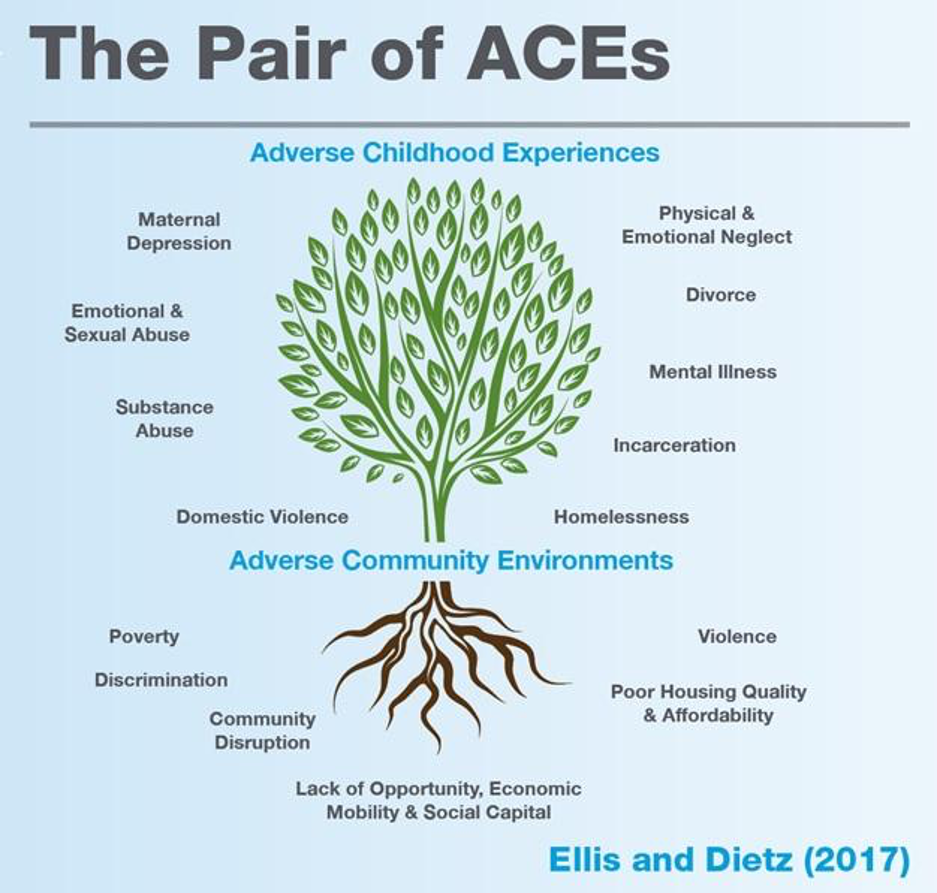
What are ACEs?
Our early experiences matter. If children are routinely exposed to situations such as domestic violence, mental ill health, problematic use of alcohol or other substances, this can lead to negative impacts which can last into adulthood. Such chronically stressful situations are called Adverse Childhood Experiences (ACEs) and they are often associated with poorer outcomes across the lifespan in terms of educational attainment, employment, involvement in crime, family breakdown, and a range of health and wellbeing measures.
“The foundation matters; it’s easier to get it right the first time. But later matters, too; there are always things we can do to shore up anything that’s not as strong as it could be.”
Positive Childhood Experiences (PCEs) have been shown to act independently of Adverse Childhood Experiences, so a key message is that the quality of our relationships matter and having a sense of belonging and connection in our familes, school, workplace or community can buffer negative experiences.
What is an Adverse Childhood Experience?
Adverse Childhood Experiences (ACEs) are stressful experiences occurring during childhood that directly harm a child or affect the environment in which they live. (Bellis et al 2016)
ACEs can include the following:
- Verbal abuse
- Physical abuse
- Sexual abuse
- Physical neglect
- Emotional neglect
- Parental separation
- Domestic violence
- Mental ill health
- Alcohol or drug misuse
Impact of four or more ACEs
- Image

2 times more likely to have a chronic disease
- Image

3 times more likely to have respiratory disease
- Image

3 times more likely to develop coronary heart disease
- Image

4 times more likely to develop type 2 diabetes
- Image

4 times more likely to be a high risk drinker
- Image

6 times more likely to smoke tobacco or E-cigs
- Image

11 times more likely to have smoked cannabis
- Image

16 times more likely to have used crack cocaine or heroin
- Image

20 times more likely to have been incarcerated in their life
The Pair of ACEs Model

The Pair of ACEs model is based on research that looked at community resilience and what helps or hinders. We know that poverty, poor housing etc, exacerbate, or compound, the individual or the family response to other adversities. They can make what was a tolerable situation of stress, toxic.
It is important to think about adversity in a way that does not simply 'pathologise' individuals but sees that they have a ripple effect upon whole family systems, communities and ultimately, societies. Adversity and trauma is a societal issue.
Ellis and Dietz (2017) devised this transformative approach in USA, the Building Community Resilience model, to
''foster collaboration across child health systems, community based agencies and cross sector partners to address the root cause of toxic stress and childhood adversity, and build community resilience''.
Emphasis was for clinicians to see beyond the clinical environment to address social determinants that lead to adverse child and community experiences which both impact upon early childhood development.
We can all play a part in sharing how to effectively translate what is known about adversity, trauma, and resilience into efforts to strengthen related policies, programs, and public agencies. We can consistently use language that expands how context shapes the outcomes of adverse events and experiences, the importance of partnership and the reality of community strengths – and offer a sense of realistic hope.
The science of adversity, trauma, and resilience is a powerful tool in any effort to improve health and wellbeing. Resilience is a possibility that society needs to support.
Find out more about ACEs
You can find out more about ACEs and the impact on child development through this short animation that raises awareness of adversity and how staff, volunteers and organisations can be the change to support children, adults, families and communities.
This animation forms the basis of raising awareness of adverse childhood experiences in Northern Ireland and how you can be the change to support children, their families or adults impacted by childhood adversity.
Vimeo:
Subtitles | Without subtitles
YouTube:
Subtitles | Without subtitles